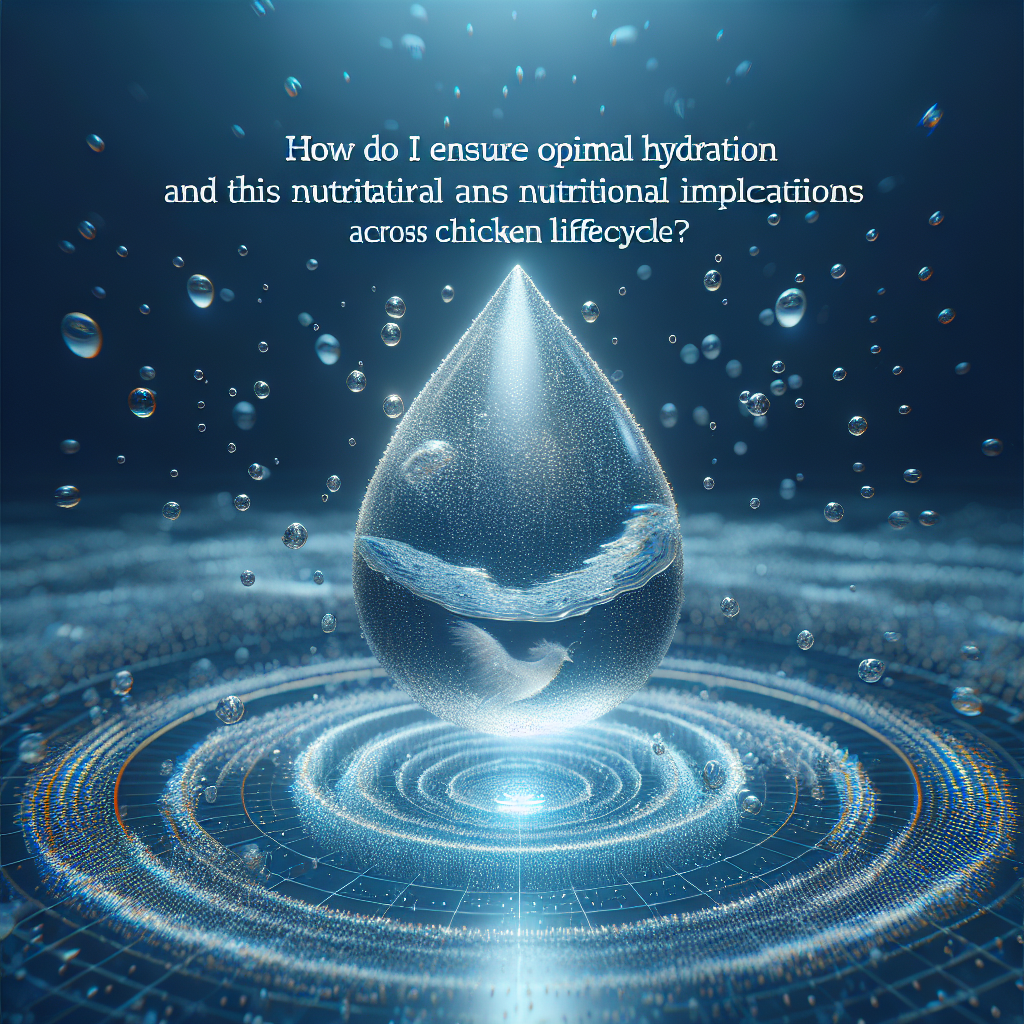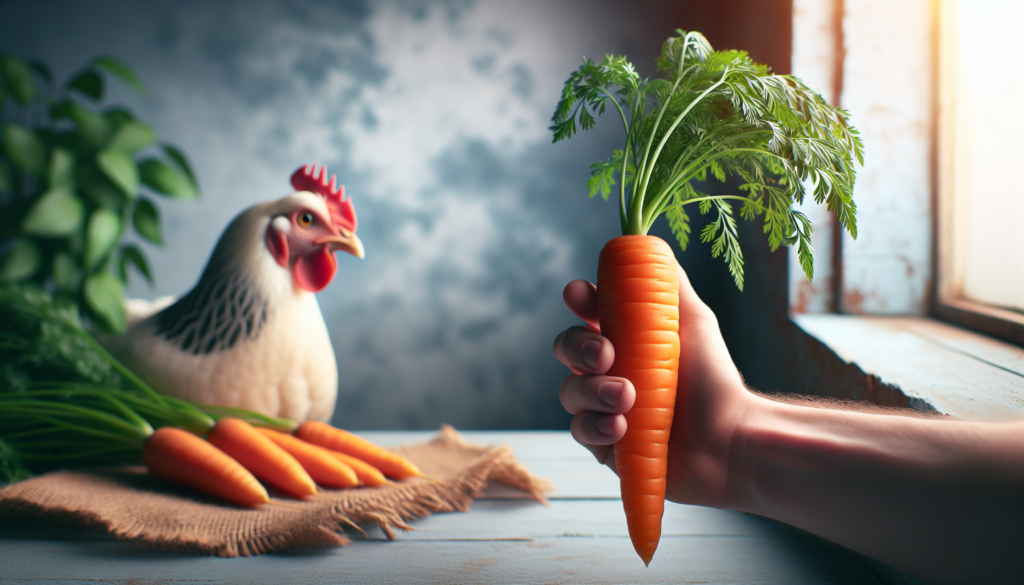In this article, we will explore the importance of ensuring optimal hydration and its nutritional implications across chicken lifecycles. Keeping chickens properly hydrated is crucial for their overall well-being and productivity. We will discuss the various factors that contribute to adequate hydration and delve into the nutritional requirements that must be met at different stages of a chicken’s life. By understanding the significance of hydration and nutrition in chicken care, you can ensure that your feathered friends are happy, healthy, and thriving throughout their lifecycles.
Importance of hydration in chicken lifecycles
Hydration needs in chicken growth
Hydration plays a critical role in the growth and development of chickens throughout their lifecycles. Water is not only necessary for basic bodily functions but also essential for nutrient absorption, temperature regulation, and overall health. As chickens grow, their water requirements increase, making it vital to provide them with a constant supply of clean and fresh drinking water.
Effects of dehydration
Dehydration can have severe consequences for chickens. When chickens are dehydrated, their body functions become compromised, leading to decreased feed intake, impaired digestion, reduced egg production, and poor growth. Dehydrated chickens also become more susceptible to heat stress, diseases, and mortality. It is crucial to understand the negative effects of dehydration to ensure the well-being and productivity of your flock.
Nutritional implications of hydration
Hydration is closely tied to nutrient absorption and utilization in chickens. An adequate water supply helps in breaking down and absorbing nutrients from their feed, facilitating digestion and metabolic processes. Additionally, hydration impacts the transportation of vital nutrients to different parts of the body, contributing to overall growth and health. Proper hydration ensures that the nutrients provided to the chickens are effectively utilized, maximizing their nutritional benefits.
Understanding hydration requirements
Water as an essential nutrient
Water is often overlooked but is, in fact, the most vital nutrient for chickens. It serves as a medium for chemical reactions, aids in digestion, transports nutrients throughout the body, and regulates body temperature. Consequently, water must be regarded as an essential nutrient in the diet of chickens, and its availability should be prioritized.
Hydration needs at different stages of chicken lifecycles
The water requirements of chickens vary depending on their growth stage. Broiler chicks, for example, require more water during the brooding period to adjust to their new environment and promote early growth. As chickens grow, their water intake gradually increases, especially during hot weather or periods of heat stress. Laying hens also have specific hydration needs to support the production of high-quality eggs. Understanding the changing hydration requirements at different stages is crucial for maintaining optimal hydration throughout their lifecycles.
Factors influencing water intake
Several factors influence the water intake of chickens. Environmental temperature, humidity levels, feed composition, and bird activity all impact the amount of water the chickens consume. As the temperature increases, chickens tend to drink more water to regulate their body temperature and cool down. The composition of the feed can also affect water intake, as certain feed ingredients may require more water for digestion. Considering these factors allows for better management of water intake and ensures adequate hydration for the chickens.
Providing access to clean drinking water
Water quality and its impact on hydration
The quality of drinking water is of utmost importance for chicken hydration. Clean and fresh water free from contaminants, bacteria, and harmful substances is necessary to maintain the health and well-being of the flock. Poor water quality can lead to reduced water consumption and possibly the transmission of diseases. Regular water testing and appropriate water treatment methods should be employed to ensure optimal hydration and minimize any negative impact on the chickens.
Water sources and availability
Providing chickens with access to sufficient water is vital. Natural water sources, such as well water or municipal water supply, are commonly used for chicken drinking water. It is essential to ensure a consistent and reliable water supply, especially during periods of high demand. Adequate water availability prevents competition among chickens and ensures that each bird has equal access to the water source.
Water temperature considerations
The temperature of drinking water can affect the water intake of chickens. Generally, chickens prefer cool water, especially during hot weather. Maintaining the water temperature at an optimal level helps encourage water consumption and prevents chickens from becoming dehydrated. Monitoring the water temperature and making adjustments, such as providing shade or using cooling methods, can help ensure that the chickens have access to water at a desirable temperature.
Optimizing water delivery systems
Types of watering systems
Various watering systems can be used to provide chickens with access to water. The most common types include nipple drinkers, bell drinkers, and troughs. Nipple drinkers are convenient and help keep water clean, while bell drinkers are suitable for broilers and can hold larger volumes of water. Troughs are often used for providing water to a larger number of birds. Each system has its advantages and disadvantages, and choosing the appropriate system depends on factors such as flock size, housing setup, and management preferences.
Benefits and challenges of different systems
Nipple drinkers, in addition to keeping the water clean, also reduce the risk of water contamination by feces or litter. Bell drinkers are easy to clean and refill, but they may require additional space and can be prone to water spillage. Troughs are effective in providing water to a large number of birds, but they may lead to water contamination if not managed properly. Understanding the benefits and challenges of each watering system allows for the selection of the most suitable option for your specific flock requirements.
Determining water flow rates
Maintaining appropriate water flow rates is crucial for ensuring that chickens have access to sufficient water. Insufficient water flow can lead to limited water intake, resulting in dehydration, reduced feed consumption, and poor growth. On the other hand, excessive water flow can lead to water wastage and wet litter conditions, increasing the risk of bacterial contamination and footpad dermatitis. Regularly monitoring and adjusting water flow rates based on flock needs and environmental conditions is essential for optimal hydration and resource management.
Managing water intake in broiler chicks
Brooding period and water consumption
During the brooding period, providing adequate water is crucial for the early development and growth of broiler chicks. Broiler chicks have a high water requirement during this stage, as they are still adjusting to their new environment and acquiring the necessary hydration to support their metabolism. It is important to closely monitor water consumption during this period and ensure a constant supply of clean drinking water to promote healthy growth.
Water space requirements
Sufficient water space is essential to prevent overcrowding and enable all broiler chicks to access water easily. Crowding around the water source can result in some chicks being unable to drink, leading to dehydration and poor performance. Providing adequate water space ensures that all chicks have equal opportunity to hydrate themselves, contributing to uniform growth and optimized performance.
Controlling excessive water consumption
While it is important to provide adequate water to broiler chicks, excessive water consumption can have negative implications. Overconsumption of water may lead to wet litter, hiding places for pathogens, and increased ammonia production. Monitoring water consumption and adjusting water flow rates accordingly can help modulate water intake to prevent excessive consumption and associated issues, ensuring optimal hydration without compromising litter quality or flock health.
Promoting hydration in growing chickens
Water availability during growing phase
As chickens grow, their water requirements increase. Providing continuous access to water throughout the growing phase is crucial to meet their hydration needs. Adequate water availability allows chickens to maintain physiological and metabolic processes required for proper growth and development. Ensuring a steady supply of clean drinking water helps prevent dehydration and promotes optimal performance in growing chickens.
Feeding strategies for increased hydration
Integrating hydration-promoting feeding strategies can further ensure optimal hydration in growing chickens. Incorporating water-rich feeds and supplements can help increase the moisture content in their diet, enhancing hydration levels. This can be achieved through the addition of fresh fruits, vegetables, or specially formulated hydration supplements in their feed. Such strategies facilitate both hydration and the intake of essential nutrients, contributing to improved growth and overall health.
Encouraging water consumption
Encouraging chickens to drink water is crucial to maintain their hydration levels. Some chickens may require extra motivation to consume an adequate amount of water. Techniques such as spiking the water with natural flavors or additives can be utilized to entice chickens to consume more water. Additionally, proper management practices such as maintaining clean and fresh water, providing adequate space, and ensuring the water is at an appropriate temperature can further promote water intake.
Maintaining hydration in laying hens
Water requirements for egg production
Laying hens have increased water requirements for efficient egg production. Water is essential for the formation of eggs, transportation of nutrients to developing eggs, and regulating body temperature during the energy-demanding egg-laying process. Insufficient hydration can lead to decreased egg production, reduced egg quality, and an increased risk of eggshell problems. Providing adequate and high-quality drinking water is essential to support the performance and productivity of laying hens.
Drinking water management in laying houses
Proper drinking water management is crucial in laying houses to ensure optimal hydration of the flock. Regular cleaning and maintenance of water delivery systems are necessary to prevent water contamination and ensure uninterrupted water flow. Monitoring water consumption and adjusting water flow rates based on flock needs and environmental conditions help maintain water availability and prevent dehydration in laying hens. Paying close attention to drinking water quality and taking necessary measures to treat any water-related issues is also essential for the well-being of the flock.
Electrolyte supplementation
Electrolyte supplementation can help maintain proper hydration levels in laying hens. Electrolytes enhance water absorption, improve hydration, and aid in the maintenance of electrolyte balance within the body. Supplementing drinking water with electrolytes during periods of heat stress or any other conditions that may increase the risk of dehydration can provide the necessary support for laying hens to continue egg production at optimal levels.
Challenges in maintaining optimal hydration
Environmental factors affecting water intake
Various environmental factors can impact water intake in chickens. High ambient temperatures, humidity levels, and air quality can all contribute to increased water requirements and greater water intake. Similarly, extreme cold weather conditions can also affect water consumption as chickens may consume less water due to lowered metabolic rates. Understanding these environmental factors and adjusting management practices accordingly is essential for maintaining optimal hydration in the face of challenging conditions.
Heat stress and hydration
Heat stress poses a significant challenge to chicken hydration. When chickens are exposed to high temperatures, they increase their water intake to regulate their body temperature through evaporative cooling. Inadequate water supply or poor water quality can exacerbate the negative effects of heat stress and lead to dehydration and reduced performance. Implementing measures to mitigate heat stress, such as providing shade, cooling systems, and ensuring an uninterrupted supply of cool and clean water, is crucial to prevent dehydration and maintain optimal hydration in chickens.
Water loss management
Water loss management is crucial to ensure optimal hydration in chickens. Methods to prevent excessive water loss, such as reducing leakage from watering systems, minimizing wet litter conditions, and controlling environmental factors that increase water evaporation, should be implemented. Regular monitoring of water flow rates, water quality, and flock behavior can help identify and address any issues related to water loss, ensuring the chickens receive the required hydration.
Monitoring and evaluating hydration status
Signs of dehydration in chickens
Monitoring the signs of dehydration in chickens is essential to ensure prompt intervention when needed. Some common signs of dehydration include reduced feed consumption, weight loss, reduced activity, lethargy, dry and pale combs, and increased mortality. Observing the behavior and appearance of the flock, as well as their water consumption patterns, can provide valuable insights into their hydration status. Maintaining documentation and keeping track of any changes in water consumption or flock behavior is beneficial for early detection and appropriate management of dehydration.
Tools for assessing hydration levels
Numerous tools are available to assess the hydration levels of chickens. One commonly used method is to visually observe the color and consistency of their droppings, as dehydrated chickens may produce dry and clumpy feces. Skin elasticity is another indicator of hydration, as dehydrated chickens may exhibit reduced skin elasticity when their skin is gently pinched. Additionally, various portable devices and probes can measure water content in chicken tissues, providing more accurate hydration assessments. Regularly utilizing these tools can help identify and address any hydration-related issues promptly.
Importance of regular monitoring
Regular monitoring of hydration levels in chickens is crucial for maintaining optimal health and productivity. By closely observing water consumption patterns, flock behavior, and employing hydration assessment techniques, any deviations from normal can be identified and addressed promptly. Regular monitoring ensures that appropriate measures are taken to maintain adequate hydration, preventing any adverse effects on feed consumption, growth, and overall flock performance.
Hydration strategies for optimal performance
Improving feed conversion through hydration
Optimal hydration plays a significant role in feed conversion efficiency in chickens. Adequate water intake supports the breakdown and absorption of nutrients, facilitating efficient digestion and metabolism. Furthermore, hydration helps maintain the ideal body temperature required for proper metabolic function, ultimately contributing to improved feed conversion. By ensuring optimal hydration, chickens can make the best use of the nutrients provided in their feed, leading to enhanced performance and efficiency.
Impact of optimal hydration on flock health
Maintaining optimal hydration is essential for the overall health and well-being of the flock. Optimal hydration supports proper organ function, nutrient utilization, thermoregulation, and immune response. It helps prevent stress, reduces the risk of diseases, and improves resistance to environmental challenges. By prioritizing hydration, flock health and resilience can be enhanced, leading to reduced veterinary interventions and improved overall performance.
Importance of hydration management in chicken lifecycles
Hydration management is crucial throughout the chicken lifecycles for several reasons. Adequate hydration ensures optimal nutrient absorption, supports metabolic processes, promotes immune function, and helps chickens cope with environmental challenges. By prioritizing hydration, poultry farmers can maximize the performance, growth, and productivity of their flocks, while minimizing the risk of health issues and mortality. Understanding the importance of hydration management is key to ensuring the success and longevity of any chicken production operation.




